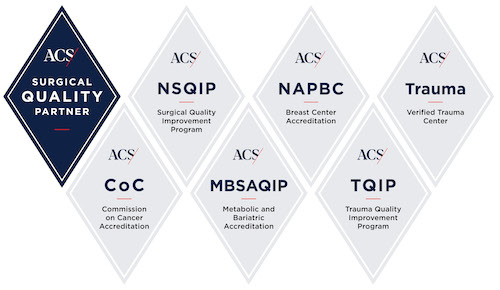Surgical Treatment for Severe Obesity
Patient Delorce Ferrell, before and after weight-loss surgery.
Virtual Visits Available
Virtual Health enables you to speak with providers using your phone, tablet or computer. Call 888-4GW-DOCS to schedule a Zoom consultation.
The rate of adult obesity in the U.S. increased three times from 1960 - 2010, and currently obesity affects about 78 million Americans, according to the Centers for Disease Control and Prevention. Weight management is much more than carrying a few extra pounds. For those with severe obesity, it can be a matter of life and death.
Many have struggled with weight loss for years trying various diets, medications and professional weight-loss services without long-term success. For these individuals, weight-loss surgery, also called bariatric surgery, may produce long-term weight loss.
Schedule an Appointment
Please fill out our general appointment form below or call our referral service at 888-4GW-DOCS.
Qualifying for Weight-Loss Surgery
Before deciding whether or not you are a candidate for bariatric surgery, your doctor will conduct a comprehensive medical evaluation that may include blood tests, EKG, chest x-ray, pulmonary function test, upper gastrointestinal x-ray, gall bladder ultrasound and/or a psychiatric evaluation. You must also meet the following criteria:
- 100 lbs over ideal weight or a BMI of more than 40, with or without co-morbid conditions
- A BMI between 35 and 40 also may qualify with associated comorbid conditions such as high blood pressure, sleep apnea, heart disease or diabetes
- Previous weight-loss efforts including medically supervised diet plans, exercise and behavioral modification programs have been unsuccessful
- Understand and be committed to the behavioral changes that will be required after surgery
You may not qualify for surgery if you have pre-existing conditions such as alcoholism, hepatic cirrhosis with impaired liver functions, serious psychiatric disability and/or correctable hormonal causes of obesity.
Many insurance plans have coverage for obesity surgery with durational limits, dollar limits, deductibles, co-payments and co-insurance factors that are no less favorable than for physical illness. Because the surgery is done for medical and not cosmetic reasons, your doctor will need to substantiate the medical necessity for the gastric bypass procedure. Your physician's office can help you better understand how to work with your insurance carrier.
Surgery. Support. Success.
Everybody’s weight-loss surgery journey is unique. That’s why GW Hospital offers more than just procedures. We support patients every step of the way, from pre-op education to life-long post-op guidance. Watch this video animation to learn more about our special, personalized approach.
Risks and Side Effects
As with any abdominal surgery, there are potential risks. However, with bariatric surgery, these risks are further complicated because of the patient's extra weight. Please discuss these risks with your surgeon. The risk of death is greatly dependent on an individual's personal health and existing risk factors. Nationally, the risk of death is approximately from .5 to 2 percent.
Expected Results
Weight-loss surgery has given many individuals a new lease on life. The amount of weight you lose will depend on the type of surgical procedure you have and how committed you are to the required lifestyle changes, including exercise and eating habits. Your age, sex and initial weight at the time of surgery also may affect surgical outcomes.
Even if the ideal weight is not reached, comorbid medical problems are improved in most cases. Many patients find they no longer need medications for diabetes, hypertension, sleep apnea, arthritis and back pain. Most patients report an increase in self-esteem and self-confidence and an improvement in their overall quality of life.
Podcast: Understanding Weight-Loss Surgery
Khashayar Vaziri, MD, discusses the two types of weight-loss surgery offered by GW Hospital (laparoscopic gastric bypass and laparoscopic sleeve gastrectomy). Both procedures are minimally invasive and allow patients a quick and less painful recovery than past surgical techniques.
Awards and Recognition
GW Hospital has been recognized by CareFirst BlueCross® BlueShield® (CareFirst) with a Blue Distinction® Centers for Bariatric Surgery designation, as part of the Blue Distinction Specialty Care program.
 The George Washington University Hospital is designated as a Comprehensive Center by the Metabolic and Bariatric Surgery Accreditation Quality Improvement Program.
The George Washington University Hospital is designated as a Comprehensive Center by the Metabolic and Bariatric Surgery Accreditation Quality Improvement Program.
The American College of Surgeons (ACS) (2024) National Surgical Quality Improvement Program (NSQIP)
 The ACS NSQIP is a standards-based data registry designed to improve hospital-wide quality across all surgical departments. ACS NSQIP helps surgical and quality teams make informed decisions about the improvement of quality of care while reducing complications and costs.
The ACS NSQIP is a standards-based data registry designed to improve hospital-wide quality across all surgical departments. ACS NSQIP helps surgical and quality teams make informed decisions about the improvement of quality of care while reducing complications and costs.
Individual results may vary. There are risks associated with any surgical procedure. Talk with your doctor about these risks to find out if bariatric surgery is right for you.


